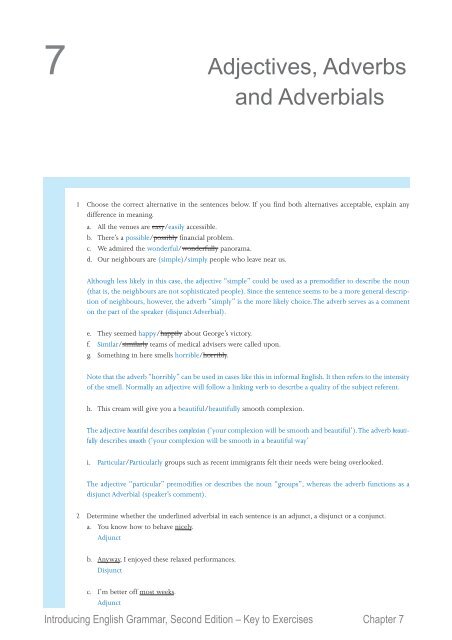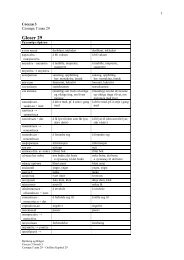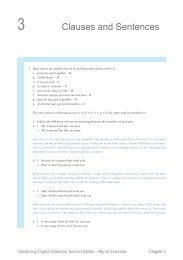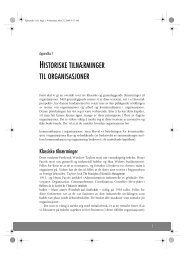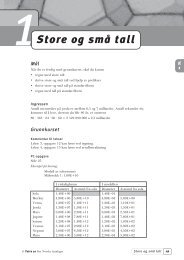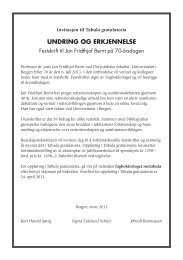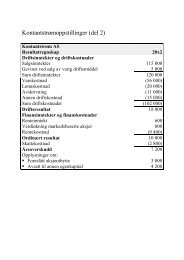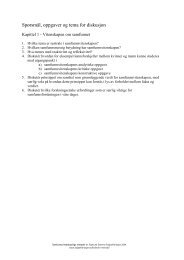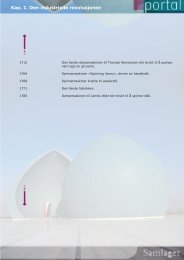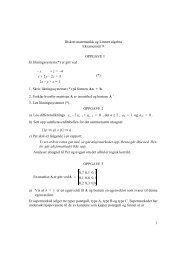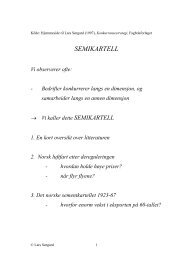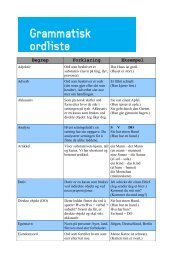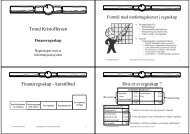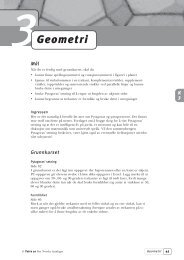7 Adjectives, Adverbs and Adverbials - Fagbokforlaget
7 Adjectives, Adverbs and Adverbials - Fagbokforlaget
7 Adjectives, Adverbs and Adverbials - Fagbokforlaget
You also want an ePaper? Increase the reach of your titles
YUMPU automatically turns print PDFs into web optimized ePapers that Google loves.
7 <strong>Adjectives</strong>, <strong>Adverbs</strong><br />
<strong>and</strong> <strong>Adverbials</strong><br />
1 Choose the correct alternative in the sentences below. If you find both alternatives acceptable, explain any<br />
difference in meaning.<br />
a. All the venues are easy/easily accessible.<br />
b. There’s a possible/possibly financial problem.<br />
c. We admired the wonderful/wonderfully panorama.<br />
d. Our neighbours are (simple)/simply people who leave near us.<br />
Although less likely in this case, the adjective “simple” could be used as a premodifier to describe the noun<br />
(that is, the neighbours are not sophisticated people). Since the sentence seems to be a more general description<br />
of neighbours, however, the adverb “simply” is the more likely choice. The adverb serves as a comment<br />
on the part of the speaker (disjunct Adverbial).<br />
e. They seemed happy/happily about George’s victory.<br />
f. Similar/similarly teams of medical advisers were called upon.<br />
g. Something in here smells horrible/horribly.<br />
Note that the adverb “horribly” can be used in cases like this in informal English. It then refers to the intensity<br />
of the smell. Normally an adjective will follow a linking verb to describe a quality of the subject referent.<br />
h. This cream will give you a beautiful/beautifully smooth complexion.<br />
The adjective beautiful describes complexion (‘your complexion will be smooth <strong>and</strong> beautiful’). The adverb beautifully<br />
describes smooth (‘your complexion will be smooth in a beautiful way’<br />
i. Particular/Particularly groups such as recent immigrants felt their needs were being overlooked.<br />
The adjective “particular” premodifies or describes the noun “groups”, whereas the adverb functions as a<br />
disjunct Adverbial (speaker’s comment).<br />
2 Determine whether the underlined adverbial in each sentence is an adjunct, a disjunct or a conjunct.<br />
a. You know how to behave nicely.<br />
Adjunct<br />
b. Anyway, I enjoyed these relaxed performances.<br />
Disjunct<br />
c. I’m better off most weeks.<br />
Adjunct<br />
Introducing English Grammar, Second Edition – Key to Exercises Chapter 7
d. If the plant is still green, then it is probably alive.<br />
Disjunct<br />
e. If the plant is still green, then it is probably alive.<br />
Adjunct<br />
f. Comsat also sold meteorological information.<br />
Conjunct<br />
g. We took him to the Castle Inn.<br />
Adjunct<br />
h. They sold information to a competing firm.<br />
Adjunct<br />
i. I’m not really worried about it to be honest.<br />
Disjunct<br />
j. For that reason he volunteered to look after Ray Marsh.<br />
Adjunct<br />
3 Explain the difference in form <strong>and</strong> meaning between the members of each pair.<br />
a. 1 She is a natural blonde.<br />
2 She is naturally a blonde.<br />
The difference between these sentences is that the adjective “natural” is used in sentence (1) <strong>and</strong> the adverb<br />
“naturally” in sentence (2). The adjective in sentence (1) functions as premodifier in the noun phrase that<br />
functions as subject predicative. The adjective classifies or describes what kind of blonde she is, namely one<br />
who does not need to dye her hair to be blonde. In sentence (2) the adverb “naturally” functions as a disjunct<br />
adverbial, which means that the speaker comments that it is obvious to him or her that she is a blonde.<br />
b. 1 This project was completed by Christopher.<br />
2 This project was completed by Christmas.<br />
The difference between these sentences lies in the prepositional phrases at the end of each clause. In sentence<br />
(1) the noun “Christopher” functions as complement of the preposition, whereas in sentence (2) the noun<br />
“Christmas” functions as complement. Both prepositional phrases function as adverbials, but the adverbial in<br />
sentence (1) is a participant adjunct (agent) <strong>and</strong> the adverbial in sentence (2) a time adjunct. Sentence (1)<br />
means that Christopher was the person (or agent) that did the work. In sentence (2) the agent of the action<br />
is not known, but instead the focus is on the time aspect: by Christmas.<br />
c. 1 The English can be fairly strange <strong>and</strong> peculiar.<br />
2 The Englishman can be fairly strange <strong>and</strong> peculiar.<br />
The difference lies in the noun phrases that function as subjects. In sentence (1) the nominalized adjective<br />
“English” functions as head. In sentence (2) the countable noun “Englishman” functions as head. The difference<br />
in meaning is that the nominalized adjective refers to a group of people (English people in general),<br />
whereas the countable noun “Englishman” in the singular refers to one person.<br />
Introducing English Grammar, Second Edition – Key to Exercises Chapter 7
d. 1 They all work hard at it.<br />
2 They hardly work at all.<br />
In this sentence pair there is a difference in word order in addition to lexical differences. In sentence (1)<br />
the pronoun “all” functions as part of the subject. The prepositional phrase “at it” functions as an adverbial<br />
(adjunct: respect) in the clause. In sentence (2) the adverb “hardly” functions as adverbial (adjunct: degree).<br />
The prepositional phrase “at all” functions as adverbial (adjunct: focus). Sentence (1) means that everybody<br />
works intensively with the project. The pronoun “all” is used to emphasize that everybody is involved. Sentence<br />
(2) means that they do very little work. The prepositional phrase “at all” emphasizes that the fact that<br />
almost nothing is done.<br />
e. 1 The Americans will see this as a hopeful <strong>and</strong> optimistic sign.<br />
2 The Americans will hopefully see this as an optimistic sign.<br />
In sentence (1) we find the adjective “hopeful”, whereas in sentence (2) we find the adverb “hopefully”. Sentence<br />
(1) also includes the coordinating conjunction “<strong>and</strong>”. In sentence (2) the indefinite article is written<br />
with an “n” because the following word begins with a vowel sound. In sentence (1) the adjective “hopeful”<br />
(along with “optimistic”) premodifies the noun “sign”. In sentence (2) the adverb “hopefully” functions as<br />
adverbial (disjunct). Sentence (1) states that the Americans will see this as a positive sign. In sentence (2) we<br />
get the speaker’s comment (“hopefully”) on his or her wish that the Americans will see this as a positive sign.<br />
4 Read the following text <strong>and</strong> answer the questions below:<br />
For Christmas shoppers watching their pennies closely, the offer of a half-price frozen turkey sounds too good<br />
to miss. Unfortunately, Tesco’s heavily promoted deal is not all that it seems. Rival supermarkets are selling their<br />
own frozen turkeys for around the same price – without the supposed 50 per cent discount. A Tesco half-price,<br />
extra-large frozen turkey is reduced to £25 from £50, while the equivalent bird sold by Asda is available at the<br />
full price of £24.<br />
In theory, stores are supposed to advertise a product at the higher price for at least 28 days before using it as a<br />
benchmark for any price cut promotions. Tesco insists that it complied with this rule because they sold the turkeys<br />
at their full original price during the summer months of August <strong>and</strong> September – when very few shoppers would<br />
want a frozen turkey. The Tesco offer reinforces the view that supermarkets try to pull the wool over customers’<br />
eyes with bogus deals. Some 42 per cent of shoppers do not believe that all offers are genuine, according to an<br />
Ipsos MORI survey.<br />
(From the Daily Mail, slightly adapted)<br />
a. The adjectives in the text that function as premodifiers of nouns have been marked in blue.<br />
For Christmas shoppers watching their pennies closely, the offer of a half-price frozen turkey sounds too good<br />
to miss. Unfortunately, Tesco’s heavily promoted deal is not all that it seems. Rival supermarkets are selling their<br />
own frozen turkeys for around the same price – without the supposed 50 per cent discount. A Tesco half-price,<br />
extra-large frozen turkey is reduced to £25 from £50, while the equivalent bird sold by Asda is available at the<br />
full price of £24.<br />
In theory, stores are supposed to advertise a product at the higher price for at least 28 days before using it<br />
as a benchmark for any price cut promotions. Tesco insists that it complied with this rule because they sold the<br />
turkeys at their full original price during the summer months of August <strong>and</strong> September – when very few shoppers<br />
would want a frozen turkey. The Tesco offer reinforces the view that supermarkets try to pull the wool over<br />
customers’ eyes with bogus deals. Some 42 per cent of shoppers do not believe that all offers are genuine, according<br />
to an Ipsos MORI survey.<br />
b. Find an adjective in the text that functions as subject predicative.<br />
In the last line of the text (in the book) the adjective “genuine” functions as subject predicative. In line 8<br />
“available” functions as head of the adjective phrase that functions as subject predicative.<br />
Introducing English Grammar, Second Edition – Key to Exercises Chapter 7
c. Analyse the structure of the adjective phrase too good to miss (line 1-2).<br />
It is a split modifier with “good” as head, “too” as first part <strong>and</strong> “to miss” as second part.<br />
d. Why is the form heavily preferable to heavy in line 2<br />
The adjective “heavy” would describe or premodify “deal”. In this case the purpose is to modify the adjective<br />
“promoted”. The adverb “heavily” says something about how the deal is promoted.<br />
e. What kinds of adverbials have been underlined throughout the text (table 7.8)<br />
For Christmas shoppers watching their pennies closely (adjunct: manner), the offer of a half-price frozen turkey<br />
sounds too good to miss. Unfortunately (disjunct: comment), Tesco’s heavily promoted deal is not all that it<br />
seems. Rival supermarkets are selling their own frozen turkeys for around the same price (adjunct: manner) –<br />
without the supposed 50 per cent discount. A Tesco half-price, extra-large frozen turkey is reduced to £25 from<br />
£50, while the equivalent bird sold by Asda (adjunct: participant) is available at the full price of £24.<br />
In theory (adjunct: viewpoint), stores are supposed to advertise a product at the higher price for at least 28<br />
days (adjunct: time) before using it as a benchmark for any price cut promotions. Tesco insists that it complied<br />
with this rule because they sold the turkeys at their full original price during the summer months of August <strong>and</strong><br />
September (adjunct: reason) – when very few shoppers would want a frozen turkey. The Tesco offer reinforces<br />
the view that supermarkets try to pull the wool over customers’ eyes (adjunct: place/manner) with bogus deals.<br />
Some 42 per cent of shoppers do not believe that all offers are genuine, according to an Ipsos MORI survey.<br />
5 Findings from the Corpus of Contemporary American English at http://corpus.byu.edu/:<br />
a. Search for the word likely <strong>and</strong> study the first fifteen occurrences of it. Does it function as an adjective or an<br />
adverb How can you tell in each case<br />
“Likely” functions as an adjective in cases where it describes or premodifies the noun, such as “likely<br />
targets”. When “likely” modifies the verb phrase, it functions as an adverb, for example “has likely been<br />
tuned” <strong>and</strong> “likely to stop”.<br />
b. Search for in a negative manner <strong>and</strong> study the list of hits. Could the adverb negatively have been used instead in<br />
all cases If you think negatively could have been used, would there have been any difference in meaning or<br />
style How about in a certain manner compared to certainly<br />
Negatively could have been used in many of the sentences with the same meaning, for instance speak negatively<br />
about somebody = speak about somebody in a negative manner. In a few cases, negatively would be unidiomatic, as in<br />
*shake one’s head negatively. On the other h<strong>and</strong> in a certain manner means “in a particular way”, which is not a<br />
likely interpretation of certainly. So in the sentences with in a certain manner, the use of certainly would either<br />
change the meaning (from a manner adjunct to a disjunct) or be wrong. (An example: I have to conduct<br />
myself in a certain manner means that a particular behaviour is called for. I have to conduct myself certainly is slightly<br />
strange, but the most likely interpretation is “I am pretty sure I have to behave”.)<br />
c. Search for of course. What seems to be its most common position, judging from the first 15-20 hits (initial,<br />
medial or end)<br />
Initial position is its most common position.<br />
d. Search for during the *. Before hitting the search button, write down the first three expressions with during<br />
the that enter your mind. Were these expressions in the list of hits<br />
The ten most frequent words following during the * in the corpus are: first, day, past, last, war, summer, early, course,<br />
next, 1980s.<br />
Introducing English Grammar, Second Edition – Key to Exercises Chapter 7
e. Furthermore is a fairly formal word. How many hits are there in the corpus What genre(s) does it occur<br />
in most often (Search hint: tick the radio button for “chart” above the search box, <strong>and</strong> you will see the<br />
genre distribution of hits as a diagram.) What kind of adverbial does furthermore function as<br />
11601 hits. It occurs most often in academic texts. Furthermore functions as a conjunct.<br />
Introducing English Grammar, Second Edition – Key to Exercises Chapter 7


